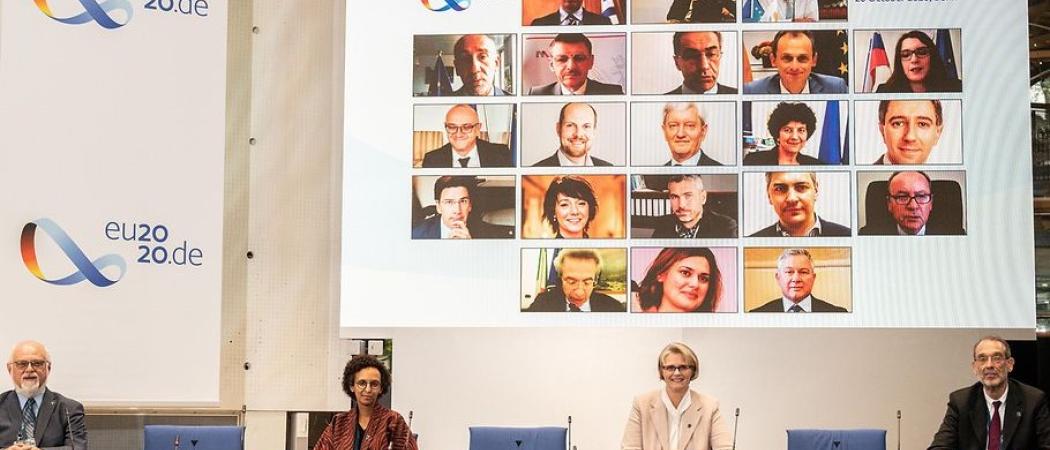The Bonn Declaration on Freedom of Scientific Research commits governments to an EU system for monitoring academic freedom. Along with safeguarding research from political intervention, the move aims to increase public trust in science

German Research Minister Anja Karliczek (second from right) with her EU counterparts at the conference in Bonn. Photo: BMBF
Eight member states have signed a declaration on academic freedom drafted by the German presidency of the EU Council, in a meeting of research and higher education ministers in Bonn.
The Bonn Declaration on Freedom of Scientific Research was signed by eight research ministers who attended the meeting in person, while the others who attended online pledged to sign it. According to the declaration, research ministers agreed to put in place “more effective” monitoring instruments to safeguard the freedom of scientific research.
“We will closely follow the establishment of a monitoring system on academic freedom in the European Higher Education Area and assess its implications for research in particular with respect to potential indicators and monitoring methods and their relevance for monitoring freedom of scientific research within the European Research Area,” the declaration says.
Germany’s push for an EU-wide commitment to academic freedom comes soon after the European Court of Justice (ECJ) ruled a controversial higher education law banning foreign universities with no campus in their home countries from awarding degrees in Hungary was illegal.
The Central European University (CEU), which operated in Budapest for more than 20 years with double US and Hungarian accreditation, lost its right to issue US-accredited diplomas and was forced to set up a new campus in Vienna, as a result
“The Bonn Declaration is an important step in the right direction,” said Antonio Loprieno, president of the European Federation of Academies of Sciences and Humanities (ALLEA). “In the recent past, the European research community has endured clear infringements on academic freedom,” Loprieno told Science|Business.
Keeping an eye out for Hungary
The CEU case dragged on for more than three years and by the time the ECJ ruled against the Hungarian government, the university had opened the campus in Vienna.
Since 2017, Hungary has been a key battleground on academic freedom. Not long after it passed the law that drove out CEU, the Hungarian parliament voted to force the Hungarian Academy of Sciences to transfer its research institutes into the oversight of the Eötvös Loránd Research Network, a new agency run directly by the government.
Earlier this year, the government appointed new leadership at the University of Theatre and Film Arts, a move which prompted students to occupy university buildings and protest the appointment of a chancellor and vice rectors who are close allies of the prime minister, a self-proclaimed Christian-nationalist. Hungary also cut funding to all university programmes in gender studies.
Asked if the Hungarian delegation signed the declaration, German research minister Anja Karliczek told Science|Business, “All delegations committed to the declaration, expressed their support and said yes we want to sign the bond declaration and want to be part of it.”
“This European Court of Justice decision is also a signal that what we did today needs to be part of a bigger picture,” said Karliczek.
Better monitoring and prevention
The EU has been criticised for not doing enough to help CEU remain in Budapest and to protect researchers at the academy of sciences from political interference.
“Let’s remind ourselves that researchers and academic institutions continue to be under pressure from governments, even in some EU member states,” said Marc Schiltz, president of Science Europe.
But academics say the declaration will be a good reminder to the EU and member states if similar problems arise in the future. The landmark ECJ ruling and a new monitoring mechanism could help the EU sanction incursions into academic freedom more quickly. “We will make sure that [member states are] actually committed to what they agreed on today,” said Karliczek.
Also, the declaration predicts greater independence of scientists and academics will also boost public trust in scientific results.
“This declaration is a sign that we can no longer stand idly by and continue business as usual and makes a clear connection between trust in science and its independence,” said Loprieno. “Academic freedom also involves the responsibility of the research community to openly communicate their findings not only to their peers, but also to the wider public,” he said.





 A unique international forum for public research organisations and companies to connect their external engagement with strategic interests around their R&D system.
A unique international forum for public research organisations and companies to connect their external engagement with strategic interests around their R&D system.